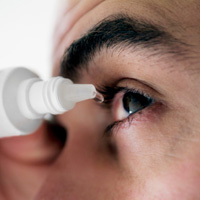Pink Eye: Usually Mild and Easy to Treat
 Pink, itchy eyes? Conjunctivitis – or pink eye – is common in adults and children. It sometimes needs medical treatment, depending on the cause. Know the symptoms, get treatment if needed, and prevent it from spreading.
Pink, itchy eyes? Conjunctivitis – or pink eye – is common in adults and children. It sometimes needs medical treatment, depending on the cause. Know the symptoms, get treatment if needed, and prevent it from spreading.
Conjunctivitis is also known as pink eye. It is one of the most common and treatable eye conditions in children and adults. It is an inflammation of the thin, clear lining inside the eyelid and on the white of the eye. This inflammation gives the eye a pink or reddish color.
What Causes Conjunctivitis?
Conjunctivitis is caused by viruses, bacteria, allergens (like pet dander or dust mites), and irritants (like smog or swimming pool chlorine) that infect or irritate the eye and eyelid lining.
What Are the Symptoms of Conjunctivitis?
Depending on the cause, the signs and symptoms for conjunctivitis may vary, but they usually include—
 Redness or swelling of the white of the eye or inside the eyelid
Redness or swelling of the white of the eye or inside the eyelid- Increased amount of tears
- White, yellow or green eye discharge
- Itchy eyes
- Burning eyes
- Increased sensitivity to light
- Gritty feeling in the eye
- Crusting of eyelids or lashes
How Is Conjunctivitis Treated?
The treatment for conjunctivitis depends on the cause. Conjunctivitis is usually mild and will often get better on its own, even without treatment. However, there are times when it is important to see a health care provider and get an antibiotic or other medical treatment. See conjunctivitis treatment.
How Do I Stop Conjunctivitis from Spreading?

Conjunctivitis that is caused by allergens or irritants is not contagious, but a secondary infection by viruses or bacteria is possible. Viral and bacterial conjunctivitis are very contagious and spread easily and quickly from person to person. By following some simple self-care steps, like washing your hands and not touching your eyes, you can reduce the risk of getting or spreading conjunctivitis. See conjunctivitis prevention.
When Should I Call a Health Care Provider?
If you have conjunctivitis, you should see your health care provider if you have—
- Moderate to severe pain in your eye(s)
- Blurred vision or increased sensitivity to light
- Intense redness in the eye(s)
- A weakened immune system, for example, from HIV or cancer treatment
- Bacterial conjunctivitis that does not improve after 24 hours of antibiotic use
 Symptoms that continue or get worse
Symptoms that continue or get worse
Conjunctivitis in Newborns
Conjunctivitis in newborns can be caused by an infection, irritation, or a blocked tear duct. A newborn baby that has symptoms suggesting conjunctivitis should see their health care provider. When neonatal conjunctivitis is caused by sexually transmitted infections, like gonorrhea or chlamydia, it can be very serious. If you are pregnant and think you may have a sexually transmitted infection, visit your health care provider for testing and treatment. If you don’t know if you have a sexually transmitted infection but have recently given birth and your newborn shows signs of conjunctivitis, visit your child’s health care provider right away.
Most hospitals are required by state law to put drops or ointment in a newborn's eyes to prevent conjunctivitis. For more information, see conjunctivitis (pink eye) in newborns.
More Information
- Conjunctivitis
- Pink Eye: What to Do (PODCAST, 3:59 minutes) – a pediatrician and parent reviews pink eye causes and treatment and suggestions on when to call or visit a doctor.
- Handwashing: Clean Hands Save Lives
- Conjunctivitis: Eye Disease Information (EyeSmart, American Association of Ophthalmologists)
- Facts about the Cornea and Corneal Disease (National Eye Institute, National Institutes of Health)
CDC works 24/7 saving lives and protecting people from health threats to have a more secure nation. A US federal agency, CDC helps make the healthy choice the easy choice by putting science and prevention into action. CDC works to help people live longer, healthier and more productive lives.
Get email updates
To receive email updates about this page, enter your email address:
Contact Us:
- Centers for Disease Control and Prevention
1600 Clifton Rd
Atlanta, GA 30333 - 800-CDC-INFO
(800-232-4636)
TTY: (888) 232-6348 - cdcinfo@cdc.gov



